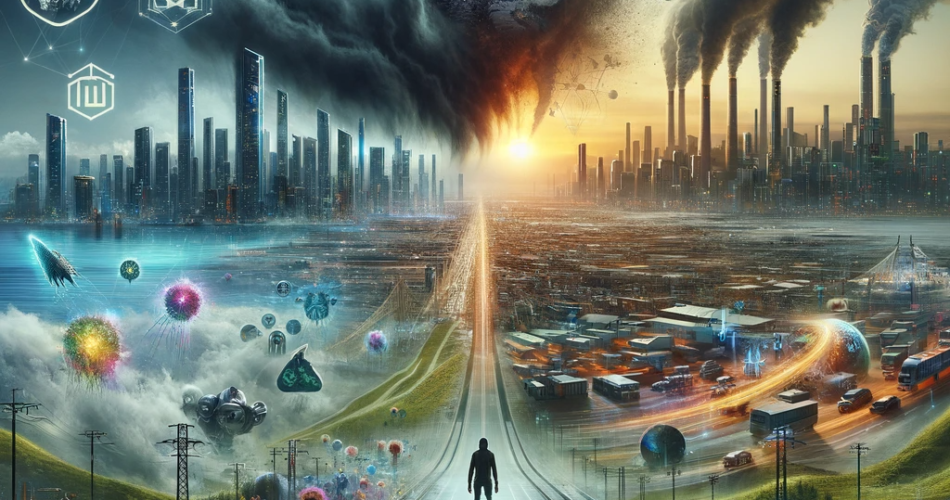Introduction: At the Precipice of Progress and Peril
As we venture deeper into the 21st century, humanity stands at a crossroads of unprecedented technological advancement and potential existential threats. This pivotal era, unique in the Earth’s multi-million-year history, is marked by our species’ newfound ability to shape the future of our planet. From AI’s transformative power to the daunting risks of biotechnology, the decisions we make today will echo through generations.
The Age of Existential Risk
A New Category of Global Risks
This century is characterized by an emerging category of existential risks that could lead to catastrophic setbacks for civilization. The stakes have never been higher as these threats, encompassing both natural and man-made disasters, hold the potential to disrupt the fabric of human existence on a global scale.
The Paradox of Technological Advancements
While new technologies in fields like biotechnology, cybernetics, and artificial intelligence promise immense benefits, they also pose significant risks. Missteps, either by error or terror, could lead to disasters of a magnitude we’ve never faced before. This duality of technology as both a boon and a bane underpins the critical need for careful stewardship of scientific progress.
The Emergence of Artificial Intelligence
AI: A Double-Edged Sword
Artificial Intelligence, often seen as the pinnacle of human ingenuity, offers capabilities that extend far beyond human cognitive limits. However, this power comes with a caveat. The application of AI in warfare, autonomous decision-making systems, and other critical areas presents potential dangers that demand careful consideration and regulation.
Ethical Implications and the Future of AI
The development of AI raises profound ethical and philosophical questions. Can we develop a moral code for AI that satisfies the diverse values of humanity? How do we ensure that AI systems do not act in ways that are unpredictable or harmful to human interests? These questions sit at the heart of current debates in both technological and philosophical circles.
Biotechnology and Its Global Implications
Advances and Risks in Biotechnology
Biotechnology, with its potential to cure diseases and improve quality of life, stands as one of the most promising fields of the 21st century. However, the same advancements that bring hope also carry risks, such as the accidental release of modified organisms or the creation of bio-weapons. The challenge lies in harnessing the benefits of biotechnology while mitigating its dangers.
The Need for Global Cooperation and Oversight
The regulation of biotechnology, much like AI, requires a global approach. As these technologies do not respect national borders, international cooperation and comprehensive oversight are essential to prevent misuse and manage risks effectively.
The Interconnected World: Opportunities and Vulnerabilities
Global Connectivity and Cascading Risks
Our interconnected world, a product of the digital age, amplifies the potential impact of existential risks. A crisis in one part of the world can cascade globally, affecting billions. This interconnectivity, while offering opportunities for collaboration and rapid dissemination of knowledge, also makes us more vulnerable to systemic failures.
The Responsibility of Scientists and Policymakers
Scientists and policymakers play a crucial role in navigating this complex landscape. Their decisions must be guided not only by scientific understanding but also by ethical considerations, societal values, and the potential long-term impact of their actions.
The Philosophical Dimension: Redefining Humanity
Consciousness and AI
The development of AI and biotechnology not only challenges our technological capabilities but also our philosophical understanding of consciousness and what it means to be human. The possibility that machines might develop consciousness raises profound questions about identity, rights, and the nature of intelligence.
Human Evolution in the Technological Era
As we integrate AI and biotechnology into our lives, the very definition of being human may evolve. The augmentation of human capabilities through technology represents a significant shift in our evolutionary trajectory, redefining our place in the natural world.
Conclusion: Steering Towards a Hopeful Future
In conclusion, the 21st century presents us with challenges and opportunities of an unprecedented scale. As we harness the power of AI and biotechnology, we must tread carefully, balancing the pursuit of knowledge with the responsibility to safeguard our future. It is through informed, ethical decision-making and global cooperation that we can navigate these existential risks and steer humanity towards a hopeful, thriving future.

